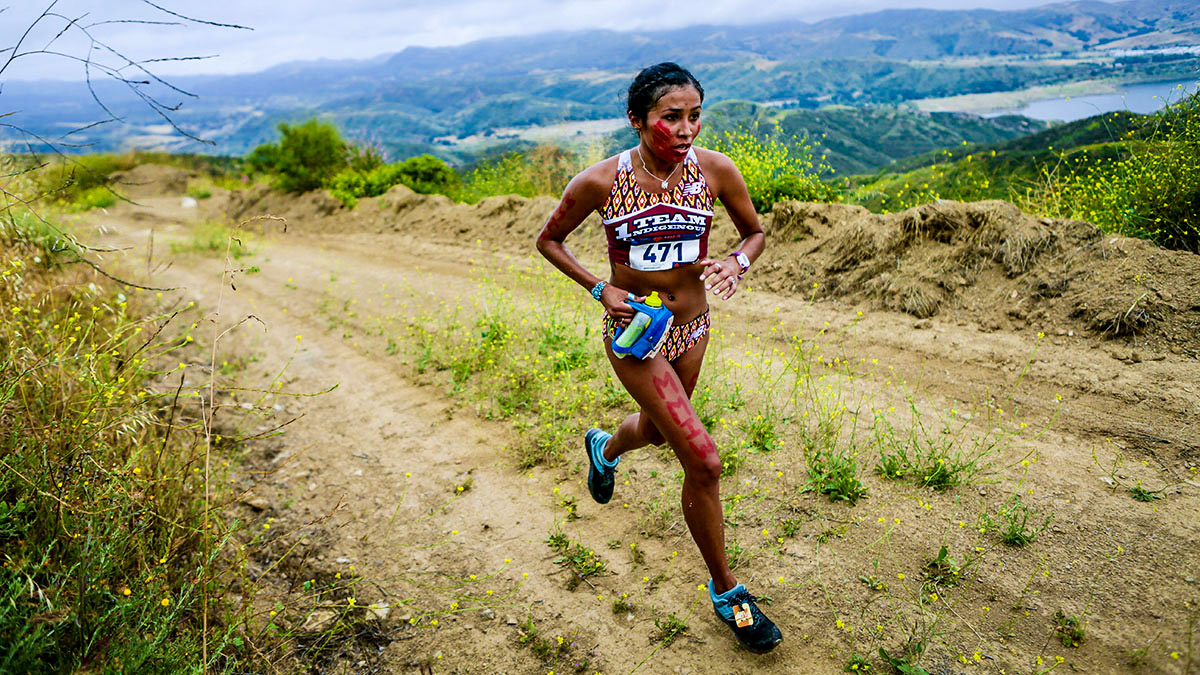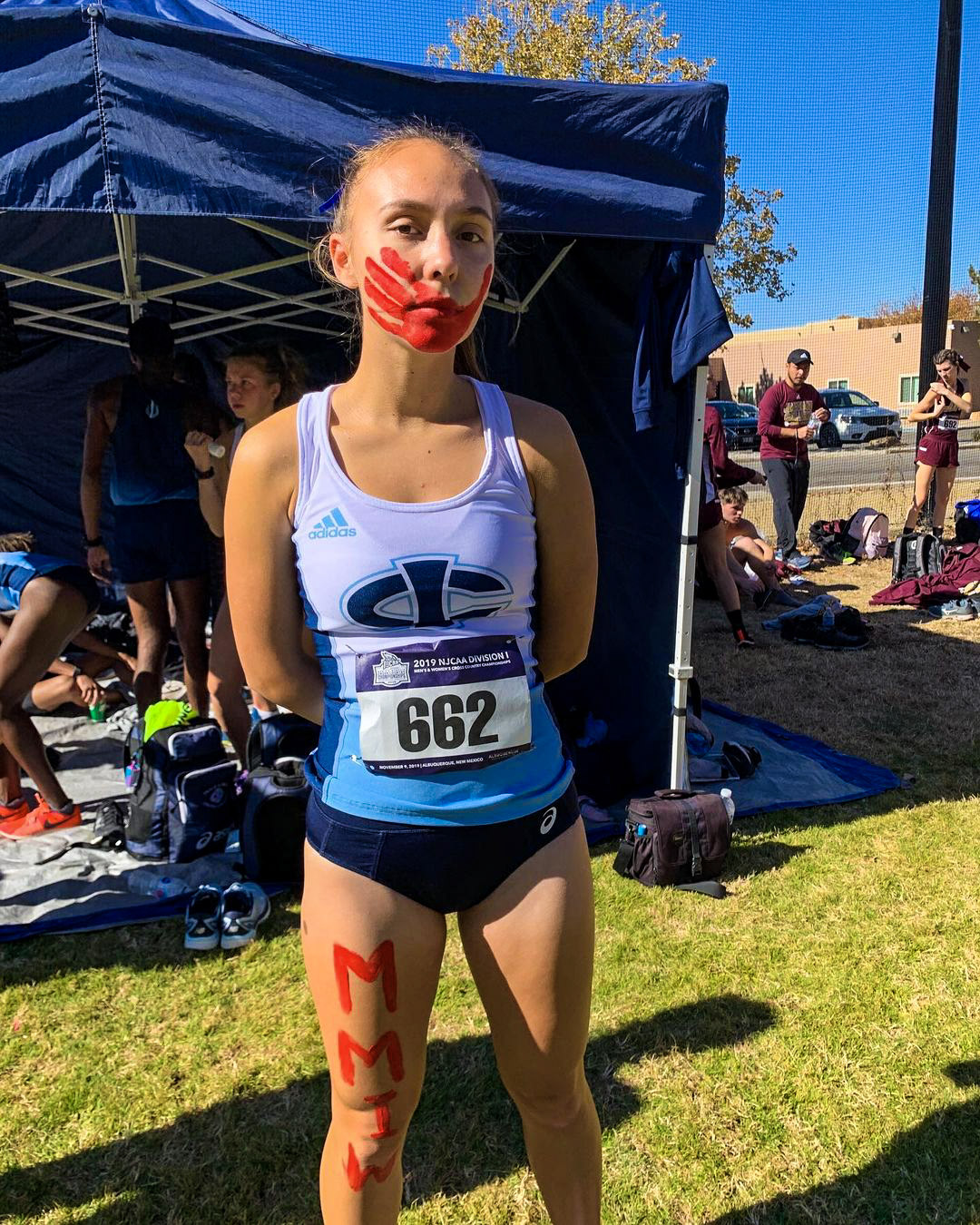Indianz.Com > News > Cronkite News: Young athletes raise awareness for missing and murdered

Lending a hand(print)
Athletes raise awareness for missing, murdered Indigenous women
Wednesday, January 6, 2021
Cronkite News
PHOENIX – The sight can be jarring: As a runner’s graceful stride brings her closer, her face comes into focus.
A rich, red handprint covers her mouth.
We will not be silenced.
The painted hand has become a powerful symbol for the Missing and Murdered Indigenous Women Movement, known as MMIW, a cause boosted by the increasing number of athletes embracing it.
“I didn’t really think the paint would impact me as much,” said Rosalie Fish, a member of the Cowlitz Tribe of southwest Washington and a standout runner whose stops have included the Nike Cross Regional Southwest in Casa Grande. “I would just be running like any other time, except now it would be for other people. But instead, it was actually very emotionally tolling to run for women that were no longer here.”
Athletes around Arizona have joined the movement. The Mesa Westwood High School girls basketball team wore jerseys at a recent tournament featuring names of missing or murdered women. The boys cross country team from Monument Valley High School on the Navajo Nation Reservation often competes with red handprints on their faces. A recent study by the Urban Indian Health Institute found that only 116 of 5,712 cases of murdered or missing Native women were logged into the Department of Justice’s nationwide database. Murder is the third-leading cause of death among American Indian and Alaska Native women, and rates of violence on reservations can be up to 10 times higher than the national average, the report said, quoting statistics from the Center for Disease Control and Prevention. The institute also took a specific look at Indigenous women living in urban areas – 71 cities – and found 506 cases of missing and murdered Indigenous women, although it considers the total low because of the challenges to collecting data. Tucson, at 31, had the fourth-most cases in the country. Athletes are increasingly widening the lens in which fans and spectators view social injustices, from focusing on movements that directly affect them to bringing a voice to those silenced by violence. As awareness for the MMIW movement continues to grow, young athletes in Arizona are using their platforms to call attention to it. “A few of the girls … have family members who are heavily involved in bringing more light to that cause,” Westwood girls basketball coach Ron Campton said. “A couple of them have family members who were directly affected by it, whether it was a direct family member who’s missing or has been murdered, or a family member of that family member. Somewhere in their family tree there is a person who has been directly affected by it.” Several factors played a role in the team’s decision to raise awareness. “Mainly because our program is, I would say from top down, varsity down to freshman level, probably 85% native … so it’s something that kind of hits home with a lot of them,” Campton said. “And it’s something that kind of gets overlooked by a lot of people in general because it doesn’t directly affect them. “We more than anything just wanted to do something good. And I preach that to our players in the program all the time. My two-word phrase that I use all the time for them is just ‘do good.’ I want them to do as many good things in their life as possible.”Westwood @WWLadyWarriors girls hoops team’s entirely native roster makes a big statement @MonarchSportsAZ #LadyX tourney before the semifinal vs Perry @LPumaBasketball. Westwood jerseys have names of missing or murdered indigenous women whose cases remain unsolved. #SayTheirNames pic.twitter.com/tfXgSnLMH9
— DANA (@iam_DanaScott) October 24, 2020
Leading the charge
One of the movement’s strongest voices comes from Jordan Marie Brings Three White Horses Daniel, an Indigenous woman, athlete and member of Kul Wicasa Oyate, the Lower Brule Sioux Tribe in South Dakota. She is committed to bringing awareness to the MMIW epidemic.
She participates in a variety of events, including prayer runs, prayer vigils and runs for charities. She recently made it a priority to bring attention to an issue she felt was only being heard throughout Indigenous communities.
She said she was “constantly seeing the work of advocates and the families fighting for justice and working towards healing and some sort of resolution and some sort of solutions, preventative measures, policies being introduced (but it) just felt like the support wasn’t there,” Daniel said. “And it got to a point where I was just fed up with it, like, I can’t keep talking about this, sharing about this, organizing panels. Like, if that’s not doing anything, I need to do something that is specifically for them.”
Daniel had kept running and activism separate in her life but finally decided to combine the two and use her platform at the 2019 Boston Marathon.
“I dedicated 26 miles, 26 prayers for 26 missing murdered Indigenous women.” she said.
“There was just an opportunity to create this space and be intentional with it and offering prayers, praying for justice, praying for visibility and support for this movement and the families and the advocates. And just my way of giving back to them and letting them know that someone among many, I’m sure, are thinking about them and not forgetting them.”
In Daniel’s Instagram post from the marathon, a photo shows the red handprint across her mouth, MMIW written down one leg and a caption to express the names behind the handprint. Once Daniels brought the movement into her running, she inspired Fish to follow in her footsteps. “It was the images of her that … actually led me to contacting her and letting her know how much she impacted me as another Indigenous runner and as another Indigenous woman,” said Fish, who runs for Iowa Central Community College. Fish hoped to raise awareness in the same way Daniel did. “She asked me for my blessing to do the same thing in her state meet a few weeks later after my Boston run, and I said, of course, and we’ve been in touch and we’ve been close ever since,” Daniel said. “And she’s done the same thing. And with her run and how intentional she was and prayerful, she elevated it even higher.” Like Daniel, Fish uses social media to promote change. In an Instagram post, she wears the red handprint and MMIW down one leg. She also lists the names of some of the missing and murdered: “13.1 miles. 13 names. Stonechild Chiefstick. Courtney Holden. Rosenda Strong. Kay Hudson. Jalajhia Finklea. Alberta Stahi. Alice Looney. Renee Davis. Massi Molina. Teekah Lewis. Jessi Sarey. Misty Upham. Jackie Salyers.”
A unified cause
From once being runners in separate spaces, Daniel and Fish now run in the same race, one of bringing change and raising awareness. They have grown their relationship, too. Daniel refers to Fish as her little sister and the two are unified to call attention to the epidemic.
The handprint is more than just red paint across their mouths. Its symbolism carries the weight of emotions behind it. Both said it takes a toll mentally and physically when preparing for and running in races. After Fish ran her first, she messaged Daniel to talk about the impact the handprint had on her during competition.
“I contacted Jordan that night and I said, ‘I felt like I ran terribly. You know, I’ve never felt like this before and I don’t know what’s going on. Maybe I’m not the right person for this.’ But Jordan told me that the feelings that I were feeling were completely expected and normal and to just accept that this was the way that I was feeling. And that’s OK. And eventually, you know, I’ll adjust.”
Daniel spends time before her races researching the names of the victims and learning the difficult details of what happened to them. It takes a toll, from insomnia to anxiety to panic attacks to nightmares to not feeling fully rested before a race.
“Having to sit with that mentally, emotionally and spiritually just weighed on me over time, and it got to the point where I finished my last race in December and I was like, ‘I need to heal. I need to work on this injury. I need to work on myself,’” she said.

Note: This story originally appeared on Cronkite News. It is published via a Creative Commons license. Cronkite News is produced by the Walter Cronkite School of Journalism and Mass Communication at Arizona State University.
Search
Filed Under
Tags
More Headlines
Cronkite News: Food sovereignty movement promotes Native foods
VIDEO: Examining 50 years of the Indian Self-Determination and Education Assistance Act in Indian Country
Native America Calling: Fresh Native creativity with a new play and new television show
AUDIO: Native American Education – Examining Federal Programs at the U.S. Department of Education
VIDEO: Native American Education – Examining Federal Programs at the U.S. Department of Education
Native America Calling: Indigenous business and the unpredictable new trade landscape
Written testimony for Senate Committee on Indian Affairs hearing on Department of Education
Native America Calling: An imbalance of deadly force by police in Canada
‘Betrayal’: Indian Country slams closure of Department of Education
Witness list for House subcommittee field hearing on Indian self-determination
Senate Committee on Indian Affairs schedules hearing on Department of Education
Cronkite News: Community pays tribute to Congressman Raúl Grijalva
Press Release: Sen. Gallego (D-Arizona) protests firings at Department of Veterans Affairs
Native America Calling: The righteous rebellion of Indigenous punk rock
NAFOA: 5 Things You Need to Know this Week (March 31, 2025)
More Headlines
VIDEO: Examining 50 years of the Indian Self-Determination and Education Assistance Act in Indian Country
Native America Calling: Fresh Native creativity with a new play and new television show
AUDIO: Native American Education – Examining Federal Programs at the U.S. Department of Education
VIDEO: Native American Education – Examining Federal Programs at the U.S. Department of Education
Native America Calling: Indigenous business and the unpredictable new trade landscape
Written testimony for Senate Committee on Indian Affairs hearing on Department of Education
Native America Calling: An imbalance of deadly force by police in Canada
‘Betrayal’: Indian Country slams closure of Department of Education
Witness list for House subcommittee field hearing on Indian self-determination
Senate Committee on Indian Affairs schedules hearing on Department of Education
Cronkite News: Community pays tribute to Congressman Raúl Grijalva
Press Release: Sen. Gallego (D-Arizona) protests firings at Department of Veterans Affairs
Native America Calling: The righteous rebellion of Indigenous punk rock
NAFOA: 5 Things You Need to Know this Week (March 31, 2025)
More Headlines